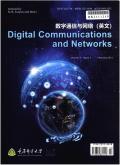Supervised Learning in Sensor Networks: New Approaches with Routing, Reliability Optimizations
IF 7.5
引用次数: 9
Abstract
Routing in sensor networks maintains information on neighbor states and potentially many other factors in order to make informed decisions. Challenges arise both in (a) performing accurate and adaptive information discovery and (b) processing/analyzing the gathered data to extract useful features and correlations. To address such challenges, this paper explores using supervised learning techniques to make informed decisions in the context of wireless sensor networks. In consideration of the unique characteristics of sensor networks, our approach consists of two phases: an offline learning phase and an online classification phase. We use two case studies to demonstrate the effectiveness of our approach. In the first, we present MetricMap, a metric-based routing protocol that derives link quality using our classifiers when the traditional ETX-based approach fails. In the second, we present SHARP, an extension to the PSFQ protocol, which uses knowledge gathered in the training phase to control its caching policy for saving constrained storage space. Evaluation is performed on a 30-node real-world testbed and a multihop sensor network in our lab. Our results show that MetricMap can achieve up to 300% improvement in data delivery rate for a high data-rate application, without compromising other performance metrics; SHARP can reduce the memory footprint of PSFQ by 46.4% with a modest increase of 4.7% in fetch miss rate传感器网络中的监督学习:路由、可靠性优化的新方法
传感器网络中的路由维护邻居状态和潜在的许多其他因素的信息,以便做出明智的决策。挑战出现在(a)执行准确和自适应的信息发现和(b)处理/分析收集的数据以提取有用的特征和相关性。为了解决这些挑战,本文探讨了在无线传感器网络环境中使用监督学习技术来做出明智的决策。考虑到传感器网络的独特特性,我们的方法包括两个阶段:离线学习阶段和在线分类阶段。我们使用两个案例研究来证明我们方法的有效性。首先,我们提出了MetricMap,这是一种基于度量的路由协议,当传统的基于etx的方法失败时,它使用我们的分类器派生链路质量。在第二部分中,我们提出了SHARP,这是PSFQ协议的扩展,它使用在训练阶段收集的知识来控制其缓存策略,以节省受限的存储空间。评估是在我们实验室的一个30节点的真实测试平台和一个多跳传感器网络上进行的。我们的研究结果表明,MetricMap可以在不影响其他性能指标的情况下,为高数据速率应用程序实现高达300%的数据传输率改进;SHARP可以将PSFQ的内存占用减少46.4%,而取错率则适度增加4.7%
本文章由计算机程序翻译,如有差异,请以英文原文为准。
求助全文
约1分钟内获得全文
求助全文

 求助内容:
求助内容: 应助结果提醒方式:
应助结果提醒方式:


